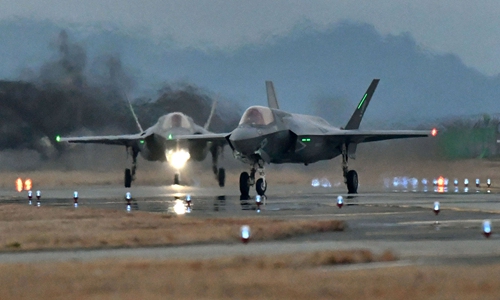What's the intention behind Tokyo's F-35 jets deal?
Source: Global Times Published: 2020/7/12 21:38:40

US F-35 fighter jet. Photo: VCG
The US State Department on Thursday approved a planned purchase by Japan of 105 F-35 joint strike fighters, including 63 F-35A conventional takeoff and landing aircraft, plus 42 F-35B short takeoff and landing variants. They're worth US$23 billion. If Japan moves the deal forward, it will become the largest operator of this type of joint strike fighter outside of the US with a total of 147 F-35s, according to media reports.Japan is pushing for this deal out of practicality. Objectively, Japan needs to upgrade its current F-2s and F-15s - not to mention its fading collection of F-4 Phantom jets.
Meanwhile, on the other hand, Japan thinks it faces pressure from China and Russia in the Asia-Pacific region. Both Beijing and Moscow have developed more advanced fourth and fifth generation fighter jets. It is a normal choice for Tokyo to purchase F-35s to offset its disadvantage.
Recently, Japan has made progress in its military modernization. The first of the Izumo-class helicopter carriers, Izumo, has marked a milestone in its transformation into the country's first true aircraft carrier since World War II. The other Izumo-class carrier Kaga is also under transformation. Both ships will be converted into light aircraft carriers on which roughly 20 F-35s can be deployed.
But light aircraft carriers are very limited in their combat capabilities. Due to political issues, the conversions are worrisome in certain quarters because they represent "the first time" that modern Japan has had fixed-wing aircraft carriers.
Tokyo today is adopting a strategy of taking small and rapid steps in carrier development. Of particular concern will be any plan by Japan to develop real carriers over 50,000 tons. If they purchase a large number of F-35Cs, it will signify a new stage of Japanese aircraft carrier development.
Such a large-scale military expansion in Japan is worrying, especially to its neighbors. There are concerns Japan will break its peaceful constitution. This could turn the Japan Self-Defense Forces into an actual aggressive army. This is undoubtedly worrisome to countries that suffered in World War II because of Japanese militarism.
Japan is a military ally of the US. It is also part of Washington's so-called international coalition that targets China. Tokyo is cooperating with Washington by building an anti-missile system, which will affect the missile strike capabilities of China and Russia. This to some extent could be a serious threat to Beijing and Moscow.
Without independent military capabilities, Japan is unable to escape being dictated by the US. Although Tokyo has its own plans and doesn't want to be completely steered by Washington, the US will definitely tie it up tightly and use it to create a camp containing China and Russia, which is its practice of major power competition.
The US is not a tiger - neither a real one nor a paper one. A tiger doesn't call for help in a fight. But Washington is a wolf. Wolves always go hunt in group. And as an alpha wolf, it is leading a so-called international coalition with wolf pack tactics. In this situation, the US has given Japan special missions: namely ensuring logistical support and building anti-missile systems. Such strategies pose a threat to regional and global peace and stability. China and Russia will need to work on how to deal with this US challenge.
Japan is limited in terms of its own military capabilities. It has obvious weakness. It is only capable of integrated combat with the US' help. But Tokyo aims to break the restraint of its peaceful constitution by taking advantage of its role with Washington's wolf pack tactics. The Japanese know that they can only develop their military with US permission. And they are being crafty about that now.
The biggest problem with Japan is that it still white-washes the past and never really apologizes. If Japan grows militarily stronger again under an indulgent and unwise US, it will certainly make neighboring countries feel uneasy.
The article was compiled by Global Times reporter Xu Hailin based on an interview with Song Zhongping, a military expert and TV commentator. xuhailin@globaltimes.com.cn
Posted in: VIEWPOINT